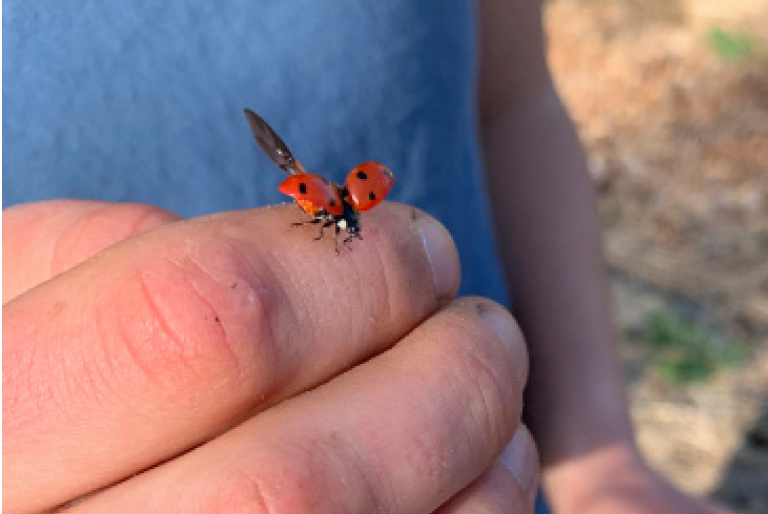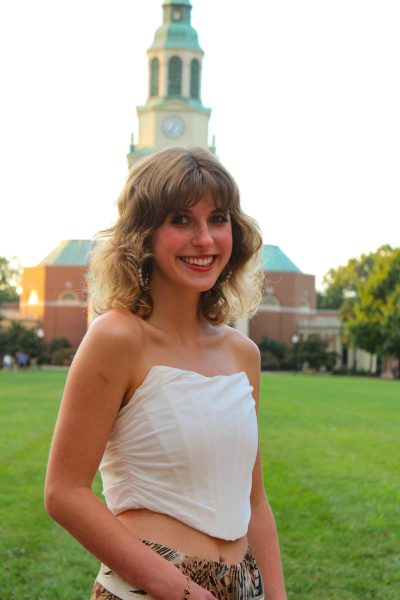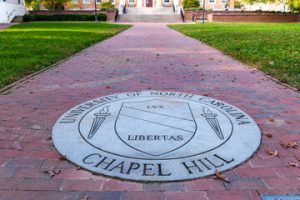Campus Garden celebrates the spring equinox
Music, art, animals, food and creative activities will be at Campus Garden to welcome the first day of spring
Native insects and pollinators are buzzing around the campus garden, indicating the coming of spring.
March 15, 2022
As cherry blossoms and daffodils have begun to speckle Wake Forest’s campus with color, Campus Garden is preparing to celebrate the spring equinox on Sunday, Mar. 20 from 4-6 p.m. The event is open to the student body and is expected to draw crowds to the garden at 1141 Polo Rd to enjoy the sunshine and celebrate the coming of spring.
In the northern hemisphere, the spring equinox occurs when the sun moves north across the celestial equator. During an equinox, direct sunlight shines on the equator, so that the length of day and night is nearly equal for both hemispheres. Historically, the spring, or vernal equinox, signifies the first day of spring.
Celebrating the spring equinox is a centuries-old tradition that has a different significance for many cultures. Crowds gather during the spring– and fall– equinoxes at the ruins of Chichen Itza, the ancient Mayan city in Mexico, to watch as the afternoon sun creates shadows that resemble a snake moving along the stairs of the 79-foot-tall Pyramid of Kukulkan, also called El Castillo. In Northern India, the spring equinox is a time to celebrate Holi, a colorful festival that involves throwing colored powder to celebrate the many colors of spring. In Central Asia, it is known as Nowruz and is a day for spring cleaning, growth and bonfires. Thailand celebrates the coming of spring with the Songkran Water Festival, which involves street-wide water “fights” and splashing. The U.S. First Lady hosts the annual White House egg roll party, a tradition that has been around since the 1800s.
At Wake Forest, Campus Garden plans to hold its own celebration of the event, with a focus on sustainability, environmentalism and “plant-forward” lifestyles. The garden interns have tried to incorporate elements of traditional equinox celebrations from other cultures as well as an emphasis on nature and gardening in their event planning.
“We really want this to be a celebration of the coming of spring and new life,” senior Caroline Walker, a Campus Garden intern, said. “There will be music, pins and badges to take home, plant-forward food available, and baby chicks and bunnies to meet!” Walker said.
According to Walker, the Spring Equinox festival used to be an annual event, but it has been canceled for the past two years due to COVID-19. “I am so glad we can finally start this tradition again,” said Walker. “It’s such a great opportunity to introduce students to the garden and educate them about the earth.”
In past years, the Spring Equinox festival has marked the beginning of Earth Month, a month-long extension of Earth Day put on by the Office of Sustainability. This year, Campus Garden plans to restart the tradition. Campus Garden Manager Nathan Peifer emphasized that the ecological significance of the spring equinox is part of Campus Garden’s desire to host a celebration geared towards sustainability.
“Since 2017, the Spring Equinox Celebration has been the signature event that starts the Office of Sustainability’s Earth Month programs. It’s a time to celebrate life and the newness of spring,” Peifer wrote in an email.
“Over the past couple of years, we’ve introduced students to baby chicks and honeybees, plant-forward dining and vegetable gardening, the Jewish celebration of trees called Tu BiSchvat, which happens in January, and a variety of campus organizations including our partner Campus Kitchen,” Peifer wrote. “Some years have included poetry readings and meditation practices that promote balance and harmony. It’s primarily a social event (with some undertones of wellbeing) that provides a few hands-on experiences related to sustainability and agriculture.”
Campus Garden Intern Ty Zanders added that spending time in the garden provides many benefits to wellness. “It’s easier for people to access nature when the weather gets warmer, so we wanted to jump on the opportunity to invite students to spend time outside.” Zanders said. “Going outside and feeling the sun radiate on your skin; it’s free dopamine from the sky.”
Zanders also expressed excitement about partnerships Campus Garden has formed while hosting the event. “We have tried to include a lot of different aspects of campus life, so there will be involvement from the Intercultural Center, the Women’s Center, Wakerspace, and many others. It should be a time filled with art, music, creation and connection and hopefully a time to introduce newcomers to the magic of the garden,” Zanders said.
“Spring is a time of growth and connection, so we wanted to represent the bonds we share with as many other campus involvement groups as possible at the celebration.”
Walker says she hopes the festival will introduce some students to the garden who haven’t engaged with the space before.
“I have learned so much from my time at the garden; not just about the environment and sustainability, but about other people too. I am continually fascinated by the people I have been able to connect with while cultivating the garden, and I would love for other students to be able to experience that as well. Hopefully, students will feel the beautiful energy of the garden and join us at our ‘connect and cultivate’ volunteer hours, which are held weekday afternoons from 5-6 p.m.”















